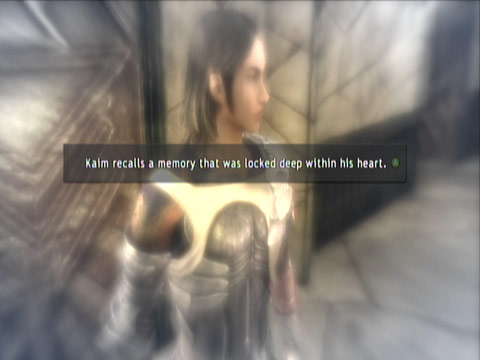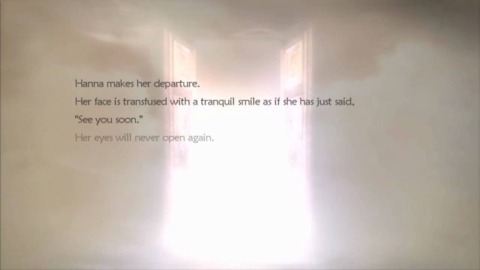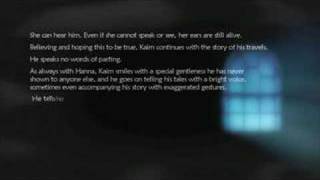Analyzing Dreams: Hanna’s Departure
By thatpinguino 1 Comments
The immortals of Lost Odyssey are effectively human in every way, save their inhuman lifespan. They fall in love. They feel pain. They feel sadness. They feel remorse. They commit and witness every folly that humanity is capable of, and they are forced to accumulate the painful weight of all of that experience with no hope of an end. These immortals are not so much gifted with immortality as cursed by it. Given all of the personal pain that must come from every human relationship they outlive, why would these immortals bother continuing to participate in human society at all? What does someone who has experienced everything have to gain from another fragile connection? “Hanna’s Departure” attempts to provide some answers to these questions, and it does so through the story of Kaim’s relationship with a girl named Hanna.

Hanna was an innkeeper’s daughter who “was frail from birth”, and as such, she was never able to really leave her house much over the course of her short life. Luckily, she was born to innkeepers who lived on the side of a major highway. Through the hundreds of guests at her parents’ inn, Hanna was able to vicariously visit the faraway lands she would never see in person. Even more fortunately, Hanna came to meet the immortal Kaim and his infinite stories. Clearly to Hanna, Kaim was a great source of information about the world beyond her home, but what Kaim – a jaded, immortal mercenary—had to gain from a relationship with a small child is a bit more difficult to discern.
Kaim’s affection for Hanna seems to center around two distinct qualities: her fragility, and her innocence. When Hanna is first introduced in the story, her smile is described as “almost transparent in its whiteness, so fragile—and therefore indescribably beautiful.” What Kaim finds beautiful about Hanna’s smile is not its whiteness or its transparency—it is its fragility that lends it incredible beauty. For an immortal such as Kaim, a brief and precarious life full of wonder must seem like everything he lacks. While Hanna is constantly thirsting for knowledge, Kaim has too many memories he wishes to forget. While she can only imagine the world outside of her home, he has seen the entire globe and found it wanting. Every day in Hanna’s life holds a sense of urgency and weight that Kaim has never known as an immortal. As Kaim sits down to tell Hanna her final story, the narrator says, “He [had] been present at innumerable deaths, and his experience [had] taught him much.” Even sitting by Hanna’s deathbed is not a unique experience for Kaim; he has and will continue to have to sit at the deathbeds of loved ones forever.

Interestingly, the end of Hanna’s story inverts Kaim and Hanna’s relationship. As Hanna dies, Kaim says, “you’ll be leaving on travels of your own soon, Hanna… You’ll be leaving for a world that no one knows, a world that has never entered into any of the stories you have heard so far.” After living several lifetimes’ worth of experiences, Hanna’s trip to the afterlife is one that Kaim can never have. In many ways death is the one journey Kaim would most like to make after surviving so many of his loved ones; instead, “his lonely travels will begin again tomorrow—his long, long travels without end.” On the one hand, as a mortal being it is hard for me to fathom looking forward to death and all of the uncertainty therein. However, for Kaim, the knowledge that death is likely his only hope for reunion with his friends and family causes him to view death as a barred exit, rather than an inescapable end. He articulates this feeling of entrapment when he says, “I can never escape this world. I can never see [Hanna] again.” Kaim clearly believes there is some afterlife to escape to that exists “far beyond the sky”. Kaim’s desire for death is further expressed through the background behind the final paragraphs. The background begins a drab shade brown with a set of closed doors to the right; but, once Hanna “departs,” the doors open and the colors shift to a paradisiacal shade of pink and white. Kaim clearly desires to step through those doors himself and see the paradise that he believes lies beyond.
The second reason that Kaim values Hanna so much is that her innocence allows him to sift through his otherwise unpleasant memories for bright spots. When telling Hanna stories, Kaim “spoke only of things that were beautiful and sweet and lovely.” Of course, Kaim’s experiences as a mercenary are often anything but “beautiful and sweet and lovely.” In fact, when between battles Kaim often drank himself into a stupor in order to forget the things he has seen and felt. Yet, when spending time with Hanna “he felt a far warmer and deeper comfort than he could even obtain from liquor.” This sense of calm and contentment is explained when the narrator says,
He told her many things… About the beautiful flower he discovered on the battlefield. About the bewitching beauty of the mist filling the forest the night before the final battle. About the marvelous taste of the spring water in a ravine where he and his men fled after losing the battle. About a vast, and bottomless blue sky he saw after battle.

In each of these sentences the first half of the sentence encapsulates the pleasant story Kaim is telling Hanna, while the back half of each sentence discloses to the player the darker truth behind each memory. Through repetition the player is forced to understand the ubiquity of combat and the battlefield in Kaim’s life. Though Kaim’s pleasant experiences change, they always circle around him going to, fighting in, or leaving from a battle. When playing the role of a children’s storyteller, Kaim is able to focus on the small beauties he has seen, rather than the bloody context in which he saw them. During his final moments with Hanna, Kaim realizes, “he told Hanna only beautiful stories of the road like this not so much out of concern for her purity, but for his own sake.” While Kaim likely began telling Hanna of his happier memories out of a sense of responsibility to preserve her innocence; he eventually realized that his time with this child was as much therapy for him as it was charity for her.
“Hanna’s Departure” sets the stage for many of the recurring conflicts in the “Thousand Years of Dreams.” Namely, how an immortal perspective can be as much a prison as it is a boon, and how connections with mortals can be a form of new-experience-lifeblood for an immortal. It also shows how even an immortal can find profound fulfillment in the company of others, especially a small, fragile child.
I pulled some of my quotes from http://www.wattpad.com/2096394-forgotten-dreams-of-eternity-lost-odyssey-thousand.
